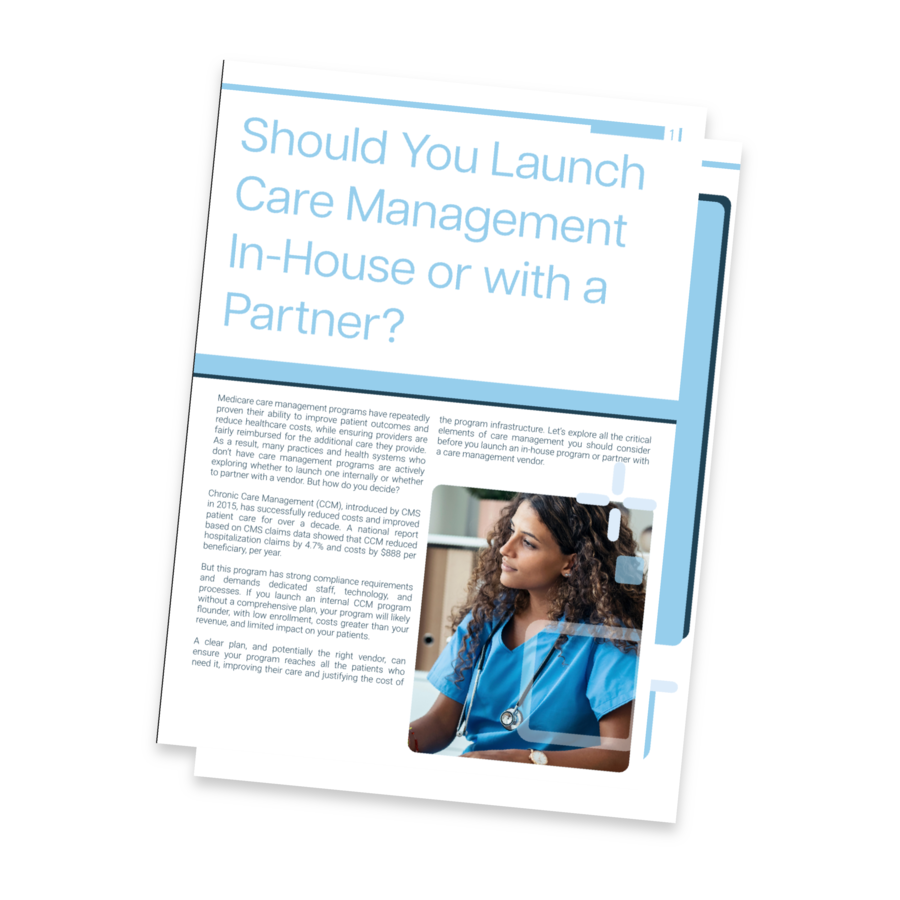
Talk with a ChartSpan Representative Today!
Our team is ready to help you improve patient care and outcomes.
Blog
Three Ways Every Provider Can Improve Healthcare for Their Patients
The push for value-based care has driven practices to try new preventative programs to benefit their patients. One of these programs is Chronic Care Management. In early 2025, 53.4% of traditional Medicare patients were in an accountable care relationship with a provider, and Medicare hopes to have that number reach 100% by 2030.
With the population of patients with multiple chronic conditions growing, the switch to value-based care can be difficult. For some practices, it can be overwhelming to decide which programs and changes, if any, are worth the time and investment and will actually produce positive outcomes for their patient population.
Chronic Care Management, a preventive care program for Medicare patients with multiple chronic conditions, offers major benefits for patients, while empowering practices to explore value-based care.

Benefits of Chronic Care Management
A Chronic Care Management program supports Medicare patients with multiple chronic conditions through regular check-ins, assistance with resources, medication, and appointments, and a 24/7 care line. CCM helps patients avoid unnecessary emergency care, access the help they need at flexible times and better meet their health goals.
1. Access to Care
Most patients have a reactive approach to health care, visiting their provider only when sick or injured. In a CCM program, the emphasis is on preventative care. The CCM care team proactively performs monthly telephonic and electronic check-ins with enrolled Medicare beneficiaries.
Every month, care coordinators dedicate 20 minutes to the care of each enrolled patient. This care is documented and billed under CPT code 99490. This proactive approach allows clinicians to provide preventative services specific to the CCM patient’s chronic conditions before their health worsens. Care coordinators might help patients set health goals, learn more about their conditions, or access resources like transportation and food delivery services.
In addition to preventative services, Medicare requires that CCM include 24/7 access to a phone care line. This two-pronged approach of reaching out proactively for preventative care but also providing extended availability makes Chronic Care Management a powerful program. CCM’s heightened access to care is intended to reduce or slow functional decline and is proven to reduce hospitalizations and emergency room visits1.
2. Healthcare Savings
Even with a small monthly coinsurance requirement, patients who are eligible and enrolled in a CCM program are shown to reduce their annual healthcare expenditures. CCM services can help patients reduce their overall healthcare spending in multiple ways:
- Preventative care keeps patients healthy and out of the hospital.
- A 24/7/365 care line and nurses who can perform Schmitt-Thompson triage reduces the likelihood that a patient would go to the emergency room for a non-urgent issue.
- The 24/7 care management access allows patients to ask questions directly to qualified healthcare professionals.
Medicare claims data shows us that with CCM, unnecessary hospital visits can be reduced by at least 4.7% and ED visits by 2.3%.1 Additionally, Chronic Care Management saves Medicare approximately $74 per patient, per month.2 These savings are major benefits of Chronic Care Management for patients.
3. Achieving Healthcare Goals
Care management clinicians work to equip patients with the tools they need for self-management of their chronic conditions. The clinicians address each patient’s chronic conditions individually and, together with their primary care or specialty provider, build goals to improve their health outcomes. These goals are then documented in a comprehensive care plan and referenced during each interaction with the patient.An effective Chronic Care Management program requires the construction of a comprehensive care plan that is accessible at any time. This plan is an all-encompassing document where the care coordination team documents every interaction with the patient.
It also includes the patient’s medical history, list of healthcare providers, health conditions, and a medication list. The comprehensive care plan is stored like a medical record in the provider’s electronic health record (EHR) and is available to the patient, provider, and approved caregivers.
Challenges CCM Patients May Face
Though CCM has many benefits, the program isn’t without its challenges. Some of the challenges that patients in a CCM program might face include:
- Busy providers and clinical staff: The health care system is often overworked. Providers and in-office staff may struggle to offer remote, preventative care to CCM patients regularly, while also providing exceptional care to in-office patients.
- Inadequate patient education: Many patients don’t fully understand their conditions and don’t know what they need to do to see progress. For example, a patient who doesn’t know what their medication does might be more comfortable skipping doses or taking it in a way that impacts absorption. CCM can help address these needs, but this requires evidence-based education to be readily available to patients. A lack of comprehensive patient education can cause patients not to adhere to their medication or care plans, leading to worsening health outcomes.
- Poor coordination: Since CCM patients often see several providers, it can be challenging to coordinate care and share information between these clinicians. One provider may not be aware of a new diagnosis or medication, which can cause an incomplete picture and impact the quality of care.
- Inadequate monitoring: Follow-up appointments ensure that the provider is up-to-date on patient progress and concerns. If the follow-up is inconsistent or nonexistent, patients could lose accountability, and outcomes may suffer. A lack of coordination between providers can often contribute to this result.
Addressing these challenges calls for an organized approach to preventative care, including an organized, well-staffed and knowledgeable CCM team. Some practices struggle to offer this level of in-house care due to the training, technology, and hiring it calls for. While a fully-managed CCM program cannot eliminate the challenges of CCM, working with a partner can help practices find enough highly-trained staff to provide effective education, coordination and support to their Medicare patients.
How a Fully-Managed CCM Program Benefits Your Patients
A fully-managed CCM program allows you to work with a dedicated team devoted to preventative care between appointments. They’ll take care of the everyday tasks of CCM like reaching out to patients, updating care plans and coordinating care with providers. Managed CCM can help improve and expand your Chronic Care Management program without increasing the demand on your practice, leaving your team to focus on in-person care.
A robust CCM program should be an extension of your team, working in tandem with the practice to deliver care that aligns with your goals. You’ll receive frequent updates and can easily incorporate CCM data into clinical and administrative workflows.
A fully-managed CCM partner will help you improve patient care through:
- 24/7 clinician communication: If your patients have questions, they can reach out to a clinician on our team for fast, knowledgeable advice.
- Enrollment services: Identifying eligible patients is often an overlooked part of CCM, since it is continuous. We take care of this step, as well as outreach and enrollment.
- Regular reports: We deliver regular reports and documentation to keep you updated on patient interactions, time spent on care, and patient status.
- Logistics assistance: Our team can help patients schedule appointments, refill medications and access test results. We can also assist with finding transportation, food and housing assistance, mobility solutions and home care.
- Medicare compliance: Under Medicare, CCM needs to meet certain conditions. We keep track of everything to make sure you meet these requirements.
A managed service provider can help you make the most of your CCM program so you can improve care and maximize revenue while staying focused on your in-person patients.

ChartSpan Gives Your Team the Tools to Be Successful
The benefits of CCM are vast, especially for patients. Preventative care with extended resources leads to overall better health and access to care.
Access to care leads to fewer hospitalizations and emergency room visits, ultimately reducing overall healthcare spending. Better care also helps improve patient outcomes and helps patients achieve healthcare goals that are specific to their needs. If providers intend to move towards effective, evidence-driven value-based care, a program like Chronic Care Management is not only crucial to patients with chronic conditions, but to our healthcare system as a whole.
The ChartSpan team is dedicated to making CCM simple and effective for you and your patients. As an extension of your team, we work with you to serve your patients without overworking your current staff. ChartSpan is a robust program that serves a wide range of practices, including primary care, specialists, Federally Qualified Health Centers (FQHCs) and Rural Health Clinics (RHCs). We support you every step of the way, from enrollment to billing, and work with any EMR/EHR. If you’d like to learn more about the benefits of preventative care for your practice, check out our quick guide to value-based care.
1 https://innovation.cms.gov/files/reports/chronic-care-mngmt-finalevalrpt.pdf
2 https://acl.gov/sites/default/files/programs/2017-12/TIM%20TALKS_Business%20Planning_Care%20Management_May%2031_2017.pdf
Subscribe for More Insights
Get valuable resources delivered straight to your inbox.
"*" indicates required fields





